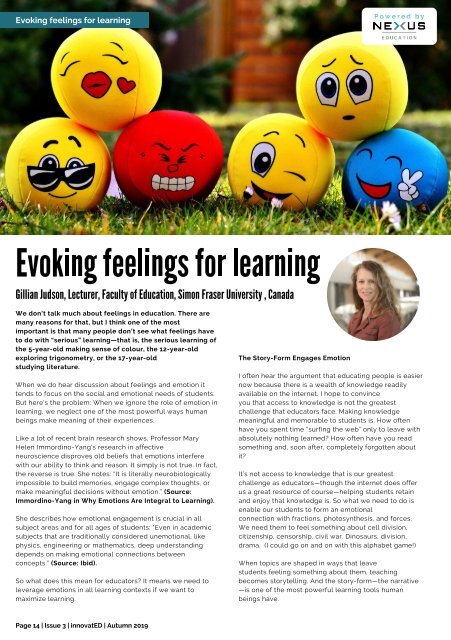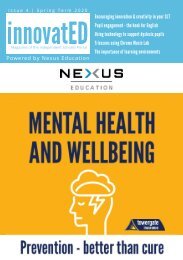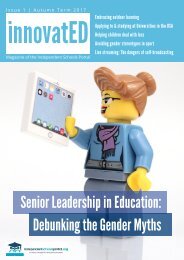innovatED Magazine - Issue 3 - Autumn 2019
A lively mix of news, articles, opinion, research, insight and regulatory updates. We take a global perspective and bring the latest developments and outstanding practice from across the world and across different sectors to enable educators to deliver the very best for their pupils. Produced by an experienced and knowledgeable teaching and school leadership team, innovatED is a termly must-read for all staff rooms.
A lively mix of news, articles, opinion, research, insight and regulatory updates. We take a global perspective and bring the latest developments and outstanding practice from across the world and across different sectors to enable educators to deliver the very best for their pupils. Produced by an experienced and knowledgeable teaching and school leadership team, innovatED is a termly must-read for all staff rooms.
Create successful ePaper yourself
Turn your PDF publications into a flip-book with our unique Google optimized e-Paper software.
Evoking feelings for learning<br />
P o w e r e d b y<br />
Gillian Judson, Lecturer, Faculty of Education, Simon Fraser University , Canada<br />
We don’t talk much about feelings in education. There are<br />
many reasons for that, but I think one of the most<br />
important is that many people don’t see what feelings have<br />
to do with “serious” learning—that is, the serious learning of<br />
the 5-year-old making sense of colour, the 12-year-old<br />
exploring trigonometry, or the 17-year-old<br />
studying literature.<br />
When we do hear discussion about feelings and emotion it<br />
tends to focus on the social and emotional needs of students.<br />
But here’s the problem: When we ignore the role of emotion in<br />
learning, we neglect one of the most powerful ways human<br />
beings make meaning of their experiences.<br />
Like a lot of recent brain research shows, Professor Mary<br />
Helen Immordino-Yang’s research in affective<br />
neuroscience disproves old beliefs that emotions interfere<br />
with our ability to think and reason. It simply is not true. In fact,<br />
the reverse is true. She notes: “It is literally neurobiologically<br />
impossible to build memories, engage complex thoughts, or<br />
make meaningful decisions without emotion.” (Source:<br />
Immordino-Yang in Why Emotions Are Integral to Learning).<br />
She describes how emotional engagement is crucial in all<br />
subject areas and for all ages of students: “Even in academic<br />
subjects that are traditionally considered unemotional, like<br />
physics, engineering or mathematics, deep understanding<br />
depends on making emotional connections between<br />
concepts.” (Source: Ibid).<br />
So what does this mean for educators? It means we need to<br />
leverage emotions in all learning contexts if we want to<br />
maximize learning.<br />
The Story-Form Engages Emotion<br />
I often hear the argument that educating people is easier<br />
now because there is a wealth of knowledge readily<br />
available on the internet. I hope to convince<br />
you that access to knowledge is not the greatest<br />
challenge that educators face. Making knowledge<br />
meaningful and memorable to students is. How often<br />
have you spent time “surfing the web” only to leave with<br />
absolutely nothing learned? How often have you read<br />
something and, soon after, completely forgotten about<br />
it?<br />
It’s not access to knowledge that is our greatest<br />
challenge as educators—though the internet does offer<br />
us a great resource of course—helping students retain<br />
and enjoy that knowledge is. So what we need to do is<br />
enable our students to form an emotional<br />
connection with fractions, photosynthesis, and forces.<br />
We need them to feel something about cell division,<br />
citizenship, censorship, civil war. Dinosaurs, division,<br />
drama. (I could go on and on with this alphabet game!)<br />
When topics are shaped in ways that leave<br />
students feeling something about them, teaching<br />
becomes storytelling. And the story-form—the narrative<br />
—is one of the most powerful learning tools human<br />
beings have.<br />
Evoking feelings for learning<br />
Page 14 | <strong>Issue</strong> 3 | <strong>innovatED</strong> | <strong>Autumn</strong> <strong>2019</strong>






